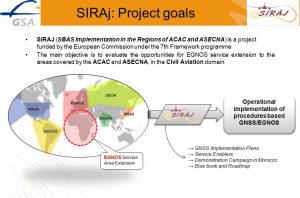SBAS
Background
The use of EGNOS-based services needs to include an imperative step: to have a solid program of international collaboration available to foster support for the necessary infrastructure, and for enablers to be in place as soon as possible and covering the greatest area. The limited investment required and the high return makes the following regions the most interesting in the short and long term: the Mediterranean coast, the Arabian Peninsula and Africa. GNSS service promotion in the region is as important as creating the appropriate framework for the necessary infrastructure for operations, starting with the required steps to set up local EGNOS operator institutions for each of the sub-regions. In April 2010, EGNOS will provide a certified signal in space for safety-of-life service for the European continent, whereas a potential extension to other areas, such as the Mediterranean, most of Africa and the Arabian Peninsula, is currently being studied by several European and local institutions. Aviation is the sector that will benefit the most and should be the precursor to extending EGNOS-based applications. This is the time to disseminate and prove the benefits of EGNOS to the decision-makers in areas outside Europe. Launched in 2006, METIS (Mediterranean introduction of GNSS services), a GSA project, aimed at supporting the GNSS service markets in the Mediterranean region.
Objectives
SIRAJ aims to perform concrete actions in support of the EGNOS service extension to areas covered by the Arab Civil Aviation Commission (ACAC) and the Agency for Aerial Navigation Safety in Africa and Madagascar (ASECNA) by promoting and demonstrating the benefits of a critical sector, i.e. civil aviation in a real environment, and also by taking the necessary actions to develop a suitable framework for a solid EGNOS extension process in the ACAC and ASECNA regions. The main objective is to take the initial actions leading to a regional EGNOS service extension with a direct and resolute strategy. SIRAJ intends to achieve a definitive regional action plan focusing on involving the major players in the process and demonstrating the benefits of EGNOS to the major regional stakeholders, thus creating the necessary solid collaborative framework between institutions to ease service extensions and future operations. SIRAJ is determined to demonstrate how a theoretical market-push, where an available infrastructure could create applications which users may need, can be turned into a market-pull, where users see the benefits and demand a series of applications which need certain infrastructures.

Description
The project has been conceived from the idea to follow up on ACAC’s and ASECNA’s interest in EGNOS. By capitalizing on the methodology and background developed in the METIS project, SIRAJ will elaborate a GNSS Regional Implementation Plan, customized for the ACAC and ASECNA regions and focused on the civil aviation sector. In order to perform this activity, SIRAJ will follow the approach successfully implemented in the METIS experience, based on various iterations, envisaging the interaction with stakeholders and a proof-of-concept demonstration. For this reason SIRAJ is organised into the following main tasks which will run in parallel and interact with each other: Task A: GNSS Regional Implementation Plan for the sub-regions within the ACAC and ASECNA areas; Task B: Customise and define the service enablers and set up a solid framework to establish EGNOS operations in each of the sub-regions; Task C: Implement proof-of-concept and field demonstrations; Task D: Conclusions and recommendations: action plan and follow-up; Task E: Promotion and co-operation framework set-up.
Results
The main expected results of the project are: to stimulate the adoption of EGNOS by demonstrating the social and economic benefits of a future EGNOS extension; to stimulate the EU GNSS industry competitiveness. By supporting the adoption of EGNOS, European companies will be able to develop new markets and face the competitiveness of other market leaders. The SIRAJ project proposes a win-win situation to all the regions involved. The adoption of EGNOS will be economically satisfactory at a regional level, since it will provide civil aviation with a new level of safety and efficiency, while the investment is far below the real cost of the system. At the same time Europe will gain new markets for its GNSS industry (infrastructure, maintenance, applications, operations, etc.). More precisely, the activity will promote the services from an honest perspective, by consulting and collaborating with local stakeholders and decision-makers. The implementation plan will show the social benefits, while the generic business plan, the service provider and airline-oriented business plans will demonstrate its validity.

